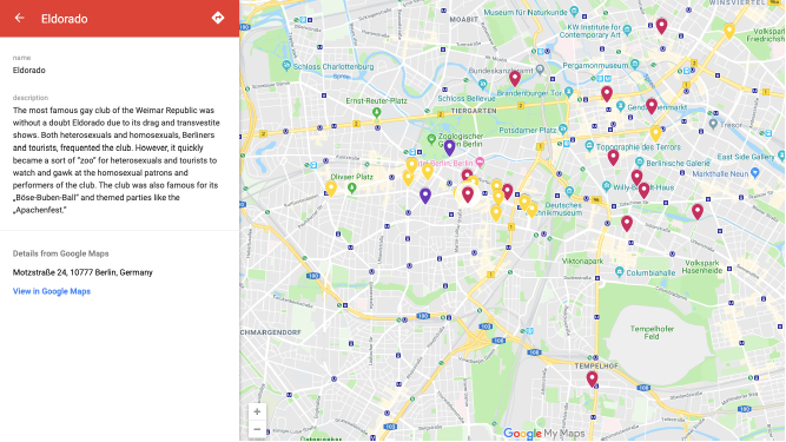We are excited to publish a post from Domenic DeSocio, who is a Ph.D. candidate in the Department of Germanic Languages and Literatures at the University of Michigan. He is currently completing a dissertation on the intersection of temporality and queer and female sexualities in German-language modernist literature. He has recently received funding to set up a teaching database of primary materials and lesson plans – and watch this space for a similar initiative from Expanding German Studies soon!
Like universities on both sides of the Atlantic, the faculty, lecturers, staff, and graduate students of the German program at the University of Michigan have worked over the last few years to decolonize and diversify our curricula and culture. Drawing from the guiding principles of the Diversity, Decolonization, and the German Curriculum initiative, we have aimed to combat forms of white, patriarchal, and heterosexist supremacies. We achieve this aim by liberating the courses we offer and the materials we teach, the projects we undertake and the methodologies we employ. We endeavor to foreground difference itself as indispensable to our ethos and to position diversifying work as integral to curriculum design, not an add-on or second thought.
As an inaugural member of the department’s Diversity, Equity, and Inclusion (DEI) Committee, I spoke with many members of my community about how they could be best served by the committee. What kinds of support would be most useful? What resources could we offer to facilitate these changes? Repeatedly, I was confronted by the logistical fact of the time-consuming nature of finding and incorporating new sources into pre-existing syllabi, set research agendas, or as the basis for new courses. Researchers and teachers lacked a centralized database of primary materials and pedagogical resources like lesson plans and activities.
In response, with fellow graduate student Özlem Karuc and Professor Kristin Dickinson I founded the DEI Research and Teaching Database. Funded by university grants, we collaborated with digital humanists to design an interactive, open-source online platform to bring together primary materials with original lesson plans, syllabi, and conceptual modules by and about groups historically marginalized due to race, ethnicity, religion, gender, sexuality, and geography. In particular, we emphasize Black and Turkish Germans, women, and LGBTQ+ folks. Our database is currently hosted on the Canvas learning management system, with specific sections dedicated to materials across time, genre, and medium, spanning two centuries from 19th-century male homosexual novels to 20th-century poems by Black German women and recent video interviews with Middle Eastern refugees in Germany.
To dive deeper into the database, I’ll first introduce its structure and then provide an example of the work we’ve been doing. Right now, the database is organized around five overarching themes: (1) Women Authors and Filmmakers; (2) Queer Literature, Music, and Visual Art; (3) Migration; (4) Race and Ethnicity; and (5) Black Germany. At the heart of each of these clusters, we offer alphabetized lists of creators, thinkers, and activists who belong to each group. Each name is provided with a short biography to introduce them to users. Most importantly, contributors from across the department are adding citations from each individual’s oeuvre, together with links to the artwork, songs, and texts (when possible) as well as detailed lesson plans, discussion questions, and project and activity ideas. Furthermore, we’re also organizing thematic modules around major nodes of German Studies, such as “the metropolis” or “media and technology.” These can serve as units for a course, for instance, or as the seeds for an entire course. Each module poses a series of questions to investigate these areas anew from the perspectives and voices of underrepresented groups and individuals. The goal is for each module to contain a syllabus as well as sample lesson plans, discussion questions, activities, and assignments.

Let me provide an example to illustrate our mission in action. For the module “The Metropolis,” we are reimagining the study of the metropolis in German Studies through the lens of sexual and gender identities and specifically through the experiences of LGBTQ+ folks. Accompanying a description and statement of goals of this project, we center a multiweek capstone project: mapping queer Weimar-era Berlin, a project I designed and implemented in my German language course “Queer German Cultures.” Students are given individualized worksheets with lists of queer Berlin establishments from the early 20th century and internet links to conduct research about them. Their task is to recover the histories of queer public infrastructure and then plot the location of these institutions with brief descriptions on a customizable Google Map.


They then combine their individual maps to create one comprehensive map. Through class presentations and discussions about the finished product, students come away with a novel understanding of modern German history through the experience of the queer city and the ways that queer people inhabited and shaped its public and private spaces. So that other instructors can adapt and use this project, the module provides lesson plans, project instructions and materials such as the lists of institutions, discussion questions, and grading rubrics.
As a final aspect of the database, we provide links to the work of like-minded colleagues in German Studies. In recognition that alongside diversified materials instructors also need to decolonize their perspectives and methods, we guide users to University of Michigan graduate student Emily Gauld’s fantastic annotated guide to anti-racist pedagogy in German Studies. We also encourage users to check out the newly established German Studies Collaboratory as well as the home of this article, the Expanding German Studies project.
We hope for this database to serve as a springboard to decolonize German curricula and programs across the globe and radically rebuild them to center underrepresented identities and students. For researchers, it will serve as a seed farm of understudied materials, fostering new lines of inquiry. Together, it aims to bring the marginalized into German Studies not as diversity tokens but as active partners in recasting our field.
